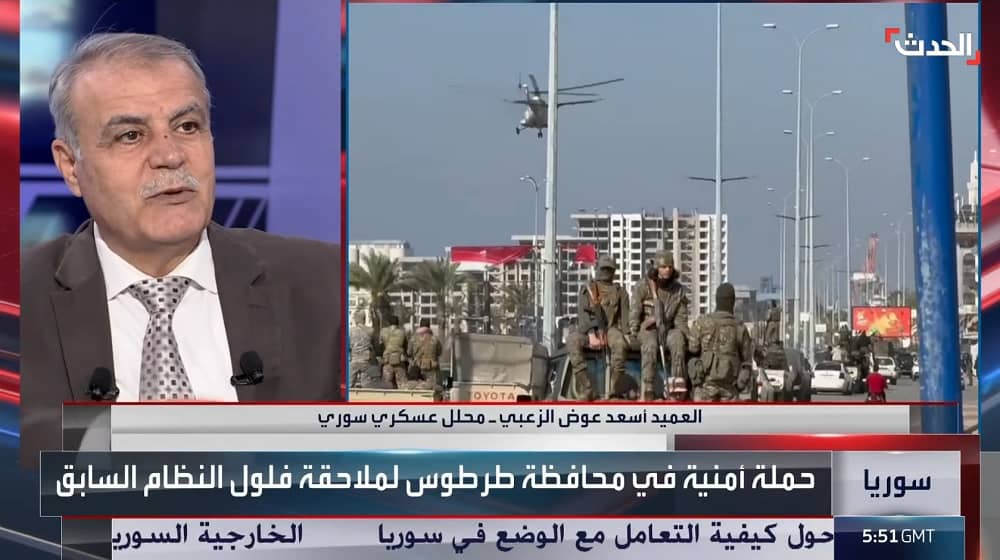Facebook
Twitter
LinkedIn
Pinterest
Reddit
Email
Print
 Brigadier General Asaad Awad Al-Zoubi, a Syrian military analyst talked to al-Haddath on January 26, 2025, revealing the methods by which Hezbollah elements infiltrate from Lebanon into Syrian territory
Brigadier General Asaad Awad Al-Zoubi, a Syrian military analyst talked to al-Haddath on January 26, 2025, revealing the methods by which Hezbollah elements infiltrate from Lebanon into Syrian territory
Syrian security forces have intercepted two major shipments of Iranian weapons destined for Hezbollah, highlighting Tehran’s ongoing efforts to support its regional proxy despite mounting challenges. According to multiple sources, including al-Haddath TV, these seizures occurred in the Sarghaya region near the Lebanese border and in Tartous, underlining the strategic importance of Syria as a transit corridor for Iranian arms transfers.
The Syrian Ministry of Interior announced on Sunday, January 26, 2025, that a substantial shipment of arms and ammunition was discovered and confiscated near Sarghaya, in the Damascus countryside. The ministry confirmed that the weapons were en route to Hezbollah in Lebanon. This marks the second major interception within a week, following the seizure of another large shipment in Tartous, which included missiles and other advanced weaponry.
Details of the Seized Weapons
Military experts revealed that the confiscated shipments included RPGs, advanced sniper rifles, night vision devices, and ammunition, some of which were state-of-the-art and indicative of Tehran’s continued support for Hezbollah. Brigadier General Assad Awad al-Zoubi, a Syrian military analyst, noted that the arms caches were part of a broader strategy by Iran’s Quds Force to destabilize the region. “These were not ordinary weapons; they were meant for urban warfare, suggesting plans for street battles or insurgency operations,” he explained.
#Iran News: #Lebanese Leader Declares Tehran’s Regional Influence Is Crumblinghttps://t.co/BlH52x8ECt
— NCRI-FAC (@iran_policy) January 14, 2025
The arms transfers reportedly involve Iranian operatives and Hezbollah forces using rugged terrain, caves, and forests along the 200-kilometer Syrian-Lebanese border to bypass detection. Syrian security operations have intensified in regions such as Homs, Hama, Latakia, and Tartous, which host hidden stockpiles of weapons and equipment. Al-Zoubi revealed that 37 arms depots have been identified in these areas, many of which are linked to Iranian-backed groups.
Reports also highlight that Hezbollah operatives, facilitated by Iranian elements, are exploiting these covert routes to transport weapons. Some shipments were allegedly intended to resupply Hezbollah units weakened by recent losses in Lebanon, where the group’s political influence has waned amid growing domestic opposition.
#Iran News: #Jordan Intensifies Border Operations Against Iranian-Linked Drug Smuggling Networkshttps://t.co/mkxomy2Hpb
— NCRI-FAC (@iran_policy) January 12, 2025
Political Ramifications
This development comes amid statements by Ahmed al-Sharaa, the new leader of Syria, who has vowed to prevent the country from being used as a conduit for arms trafficking. Al-Sharaa emphasized the need for tighter border controls to curb smuggling operations, which have drawn international scrutiny and exacerbated Syria’s fragile security situation.
Meanwhile, analysts suggest that the Syrian government, once aligned with Tehran, may be under pressure to appear more cooperative in restricting Hezbollah’s activities as it seeks to stabilize the country and rebuild its standing on the global stage. The Iranian regime’s Supreme Leader Ali Khamenei has vowed to maintain its regional influence through Hezbollah, despite major setbacks in recent months.
#Iran News: Beirut Airport’s Second Iranian Flight Inspection Heightens Tehran’s Unease Over Waning Influence in #Lebanonhttps://t.co/WelqJ5zeOV
— NCRI-FAC (@iran_policy) January 5, 2025
Regional Impact
The intercepted shipments come at a critical time for Hezbollah, which has suffered significant setbacks in Lebanon. The group has faced declining support among Lebanese citizens, heightened scrutiny from international actors, and the loss of key military leaders. Efforts by the IRGC Quds Force to resupply Hezbollah underline the regime’s commitment to using the group as a tool for advancing its geopolitical agenda.
However, these attempts also expose Tehran’s desperation and the increasing risks of its operations being uncovered. The seizures illustrate a growing divide between Syria’s leadership and its long-time Iranian ally, as Damascus faces mounting pressure to curb activities that threaten its fragile path toward stability.
As tensions continue to rise, experts warn that the ongoing arms smuggling underscores Tehran’s intent to prolong unrest in the region, even as its efforts face significant setbacks. These developments serve as a stark reminder of the broader implications of Iranian actions for regional security and stability.